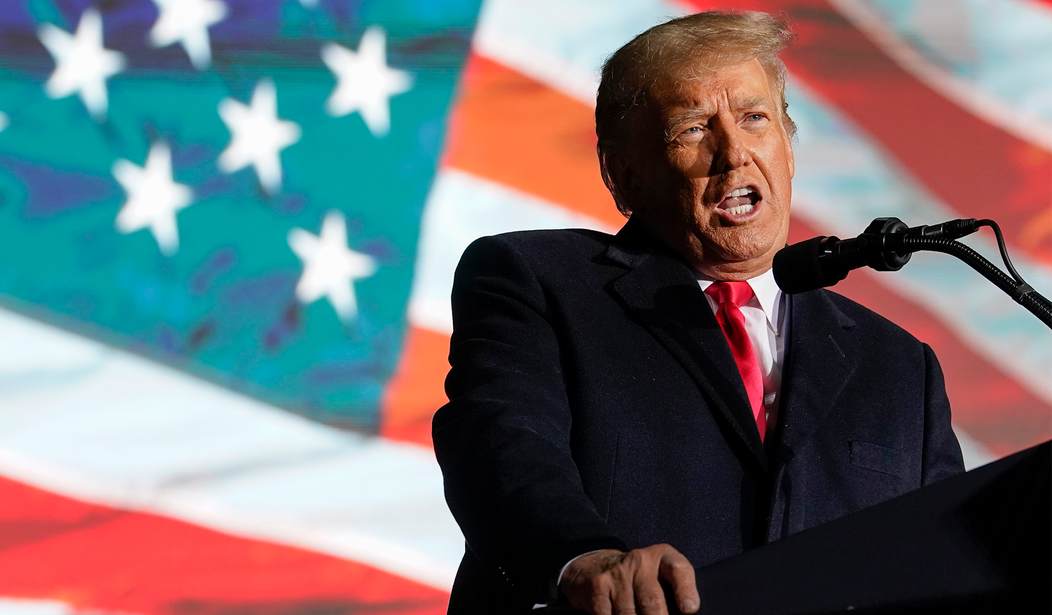Last week, the Biden administration's Attorney General Merrick Garland appointed special counsel Jack Smith to investigate former President Donald Trump, days after President Joe Biden's top GOP rival declared a third bid for the presidency.
Garland's appointment marks the naming of the third special counsel in five years to examine Trump-related matters. But this particular pick has had some major misfires, one of which took out a high-profile potential Republican presidential candidate.
In 2010, Obama Attorney General Eric Holder picked Jack Smith to run Public Integrity Section.
— 🇺🇸 Mike Davis 🇺🇸 (@mrddmia) November 18, 2022
Smith took out VA Gov. Bob McDonnell as a potential Republican presidential candidate--on bogus corruption charges.
Supreme Court reversed, 9-0.
Now Smith is back--to take out Trump.
More than a decade ago, under President Barack Obama's leadership, Attorney General Eric Holder picked Smith to oversee the Justice Department's public integrity section. A few years later, Smith's unit convicted former Virginia Gov. Bob McDonnell, a Republican, in 2014 on corruption charges for accepting over $165,000 in gifts and loans from an affluent businessman in exchange for promoting a dietary supplement. However, two years went by, and the Supreme Court overturned the conviction in a unanimous ruling that found that the jury was given faulty instructions about what constitutes bribery under federal law.
McDonnell maintained he never took any "official action" to benefit the CEO of Star Scientific Inc. or pressured state leaders to do so; he just performed routine courtesies—"everyday acts" that are part of the job, as McDonnell claimed—for the wealthy benefactor, such as setting up meetings and hosting promotional events like a launch luncheon at the governor's mansion.
Recommended
Although the former governor did receive offerings, the favors were not illegal at the time under Virginia ethics laws, and McDonnell asserted that he did nothing in return except help a constituent reach out and pitch to public health officials.
Moreover, McDonnell insisted that the CEO was never given the "official action" he sought: state funding for clinical research on the company's dietary drug. Based on McDonnell's arrangement in place, Chief Justice John Roberts determined that politicians aren't punishable by law for aiding a constituent's access to willing public officials who don't exercise actual government power. Therefore, organizing a meet-up or a networking shindig could not be defined as an "official act" under current legislation.
"There is no doubt that this case is distasteful; it may be worse than that," Roberts wrote in the majority opinion, finding that Smith's team overreached in interpreting bribery statutes. "But our concern is not with tawdry tales of Ferraris, Rolexes, and ball gowns. It is instead with the broader legal implications of the government's boundless interpretation of the federal bribery statute."
Nevertheless, the damage was done and McDonnell's political career was destroyed. The sensational indictment ended speculation that McDonnell could've been a Republican presidential contender in the 2016 race. A source familiar with the McDonnell case told CNN that Smith was involved in the decision-making process leading up to the federal charges.
Questions have also since been raised about Smith's impartiality after it was revealed that his filmmaking wife Katy Chevigny is a two-time Biden donor and produced a "gushing" Netflix movie adaption of former First Lady Michelle Obama's memoir.
According to Federal Election Commission (FEC) filings, Chevigny donated twice to President Joe Biden's 2020 campaign, contributing $1,000 to Biden For President campaign committee and another $1,000 donation to the Biden Victory Fund.
The wife of Jack Smith, the special counsel appointed by the DOJ to go after President Trump was not only a donor to Joe Biden, but also a producer of the Michelle Obama documentary pic.twitter.com/EBsJpoRZWq
— Greg Price (@greg_price11) November 21, 2022
Chevigny is credited as a producer on "Becoming," an "intimate" 2020 documentary about Obama. Big Mouth Productions, where Chevigny is employed as a director, producer, and co-founder, is one of the production companies that worked on the film.
Another flick co-produced by Chevigny and Big Mouth Productions, "Dark Money," is an anti-Citizens United documentary. The topic of the film hits close to home. Smith was a key figure tied to the notorious Obama-era Internal Revenue Service controversy.
While the Committee on Oversight and Government Reform was examining the IRS's targeting of conservative tax-exempt applicants following the Supreme Court's landmark Citizens United v. Federal Election Commission decision, it became known that the DOJ convened an October 2010 meeting with former IRS official Lois Lerner to discuss how the federal tax-collecting agency could assist in the criminal enforcement of campaign-finance laws against non-profits engaged in political speech.
The meeting, which was arranged at the direction of Smith, occurred days before Lerner spoke at a Duke University event about the purported pressure on the IRS to "fix the problem" created by the Citizens United ruling before the 2010 midterm election.
Lerner's IRS lackeys were later involved in selecting groups with the words "tea party" or "patriot" in their names for audits. The intensified IRS scrutiny prevented the targeted conservative groups from fully participating in the 2012 presidential election between Obama and Republican nominee Mitt Romney, as the federal agency admitted and apologized for the next year.
Emails had surfaced between Lerner and Smith's subordinate Richard Pilger, director of the DOJ's election crimes branch, where it was revealed that the two discussed singling out and prosecuting tax-exempt applicants at the urging of a Democrat senator.
Jack Smith has been a Swamp Creature forever.
— House Judiciary GOP (@JudiciaryGOP) November 18, 2022
Read about him in this 2014 report on the IRS’s targeting of conservatives: https://t.co/u4AaAw6pzy https://t.co/BLU1nJiTIG pic.twitter.com/jrI5ibncYJ
According to Pilger's testimony, Smith directed Pilger to contact Lerner. "It is apparent that the Department's leadership, including Public Integrity Section Chief Jack Smith, was closely involved in engaging with the IRS in wake of Citizens United and political pressure from prominent Democrats to address perceived problems with the decision," reads a 2014 letter from the House Oversight committee's leadership requesting that then-AG Holder make Smith available for a transcribed interview.
"Jack Smith is well-known and liked in leftist circles because of his role in the IRS scandal, working with Lois Lerner to illicitly target conservative groups," the Heritage Foundation's Oversight Project head Mike Howell commented on Twitter.
Jack Smith is well known and liked in leftist circles because of his role in the IRS scandal, working with Lois Lerner to illicitly target conservative groups. @Jim_Jordan and @DarrellIssa sent the below letter in 2014 mentioning himhttps://t.co/O4S7YsRGas https://t.co/1SVoAvScwj
— 🚩Mike Howell🚩 (@MHowellTweets) November 18, 2022
Smith was also at the helm when the DOJ failed to convict Democrat vice presidential candidate and Sen. John Edwards (D-NC) on allegations of using campaign funds to cover up an extramarital affair, a case which resulted in an acquittal of the Democrat on one charge and a mistrial on five others, and laid the groundwork for the unsuccessful prosecution of Sen. Bob Menedez (D-NJ).
🔥
— 🇺🇸 Mike Davis 🇺🇸 (@mrddmia) November 22, 2022
Jack Smith is the prosecutor Democrats use as a heat-seeking missile.
To take out political problems, like disgraced former U.S. Senator John Edwards (D-NC).
And political enemies, like former Virginia Governor and potential GOP presidential rival Bob McDonnell.
Now Trump. https://t.co/A34kvWBXIR
NEW: As DOJ public integrity unit chief, special counsel Jack Smith convicted GOP Gov. Bob McDonnell (overturned by SCOTUS), charged Dem John Edwards (mistrial), convicted GOP Rep. Rick Renzi (pardoned by Trump), & pursued Dem Sen. Bob Menendez (mistrial).https://t.co/JFPxpCTJuv
— Jerry Christmas 🎅🏼🎄 (@JerryDunleavy) November 22, 2022
Smith's crew had better luck securing a 2013 conviction against Rep. Rick Renzi (R-AZ) for a slew of charges, including bribery, money laundering, and racketeering. But, the former GOP lawmaker was pardoned by Trump during his last day as president.























Join the conversation as a VIP Member